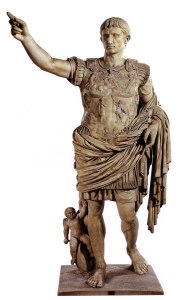What was the social setting of the church at Thessalonica? John Pollhill has a good summary of the usual arguments for the church being primarily Gentile (Paul and His Letters. 185). But this is problematic because Acts tells us the congregation was formed after a period of time teaching in the Synagogue. In addition, Jews stirred up trouble for Paul out of jealousy, presumably because of his success in their synagogue.
The argument the recipients of the letters are Gentiles rests on three observations. First, they are said to have turned “to God from idols.” Paul would not describe a Jewish convert as “turning from an idol.” Second, 1 Thessalonians 4:1-8 describes some sexual ethics problems in the church. This would be more typical of a Gentile congregation than Jewish. Third, Paul does not quote from the Old Testament in 1 Thessalonians implying a primarily Gentile church which would not be expected to resonate with biblical quotations or subtle allusions to the Hebrew Bible.
If the church is primarily Gentile, where did they come from? If the Gentile converts were God-fearers from the synagogue, then it is also unlikely they could be described as having turned from idols. In addition, a Gentile God-fearer might be expected to know as much of the Hebrew Bible as a Jewish person. The fact the second letter is laced with allusions to the Hebrew Bible makes me think there are other reasons for the lack in 1 Thessalonians. Paul was only in the city for a short time and there is no reference to evangelism in the marketplace, but he may have made contacts there which Luke chose not to report in the book of Acts.
I think the answer goes back to the persecution faced by the church. If they are persecuted for “rejecting Rome,” perhaps some of the “prominent people” Luke mentions in Acts 17:4 left the Christian church and returned to the synagogue, or to secular life. Those who remained “turned from idols,” specifically, imperial Roman cult. See this post on the charges against Paul, he was “turning the world upside down.”
Peter Oakes makes a similar point. He says “Christian failure to honour the gods would have included central Roman deities such as Jupiter, but also the deified Caesars” (p. 309). Someone like Jason was able to use wealth and power to deal with the court system in the city, so there is at least an implication that he was wealthy and connected politically. Perhaps Jason or other wealthy persons had left the church by the time Paul writes (suggested by Adolf Deissmann, c.f., Malherbe, 65).
Was there an Imperial Cult center at Thessalonica? Oakes observes that no remains of an imperial cult site have been found at Thessalonica because very little of ancient Thessalonica has been excavated. But the city was a provincial capital and the presence of an imperial cult can be seen in early coinage that called Caesar God (p. 308). Even if there was no cult temple, the city of Thessalonica was thoroughly Roman.
In Acts 17, Luke reported the charges against Paul as “preaching another king besides Caesar.” If the church continued preaching Paul’s gospel, then the Gentile converts would have certainly found themselves in a difficult political and social position.
Bibliography: Peter Oakes, “Remapping the Universe: Paul and the Emperor in 1 Thessalonians and Philippians,” JSNT 27 (2005): 301-22.




